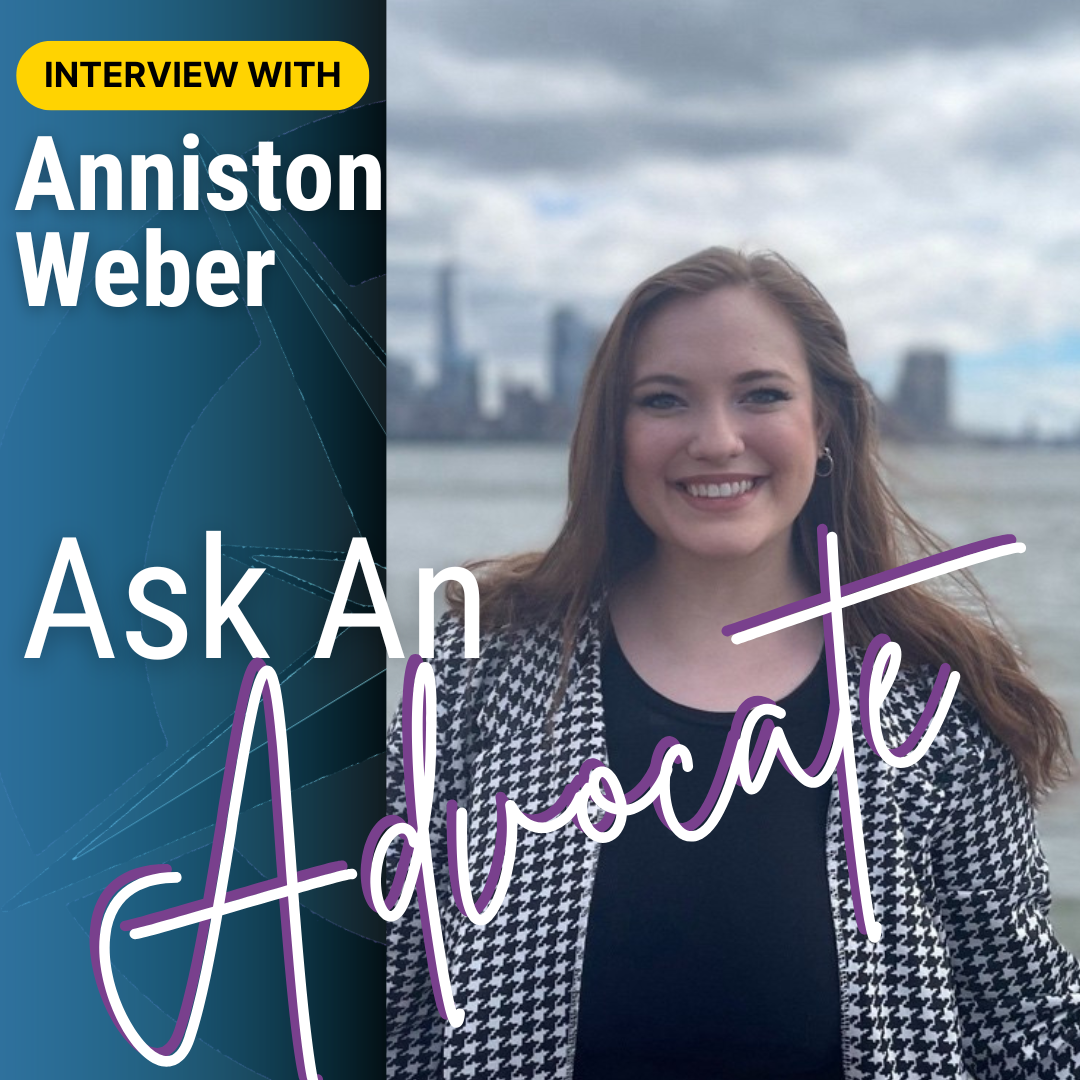We’re excited to feature Anniston Weber in our ‘Ask An Advocate’ series! Anniston has been a vital part of Options for nearly five years, beginning her time at Options as an Evening Advocate and now serving as our Campus Advocate. Her passion for outreach shines through in everything she does, from engaging with students to organizing impactful events.
Anniston also leads our annual Rock Against Rape event, helping raise awareness in a powerful way. We’re thrilled to highlight the energy and dedication she brings to our team.
Can you describe your primary responsibilities as an advocate?
“I am the Campus Advocate! I work directly with college and high school students experiencing sexual assault, stalking, human trafficking, or domestic violence. Within my role, I facilitate college sexual assault support groups, the Hays High Student Advisory Board, and I host and create a myriad of outreach and awareness events. Through this position I also get to be involved in Title IX committees and other campus-related coordinated response teams. I am also the Sexual Assault Response Team (SART) coordinator for Thomas and Russell counties, as well as the secretary for the Ellis County SART.”
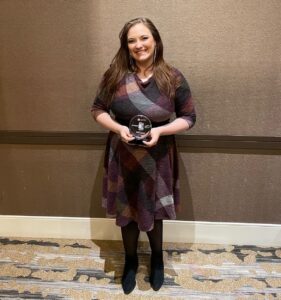 What is unique about your role?
What is unique about your role?
“The demographic of clients I see, for sure. I am heavily invested in sexual assault response and prevention – I would say that is where my expertise lies. Because I am on school campuses so regularly, I get to focus a lot of my attention on education and response as well. So, I am fortunate to be able to do a lot of public speaking and presentations within the schools. This is one of my favorite parts about the job because when people know we exist and are here to help it makes it easier for them to contact us!”
What do you believe is the most important aspect of your job as an advocate?
“All of our services are free, voluntary, and confidential. Holding ourselves to those standards is so important to me. Particularly the confidentiality aspect of the job. When someone comes to you, they are often sharing things they’ve never disclosed to anyone before, so it is absolutely paramount to move forward at their pace. Plus, confidentiality protects safety – and one of the most dangerous times for a victim of domestic violence is when they choose to leave the abusive relationship.
I also believe it is important to be extremely empathetic and understanding. People going through trauma will react in ways you may not be used to seeing. We are responsible for keeping someone grounded and on-track while still maintaining an empathetic presence.”
What are some of the key challenges you face in your role, and how do you address them?
“We have an 18-county service area. There are so many schools with so many different cultures within that space, and I want to be able to connect with them all – especially the rural ones! We live in such a rural part of Kansas that, oftentimes, we are faced with the challenge of people not believing that these issues are impacting them – but they are. It’s also hard to convince people in these smaller, tightly knit communities, to let me come in and talk to their kids about issues like sexual violence. I address this problem in particular by being approachable and understanding! For example, some schools may not want me to talk about rape culture or sexting. So, I’ll alter my presentations or chats to fit the needs of the school or teacher. The overall goal of going into schools is just to let students and parents know that we are here and available if they are ever in need of help.”
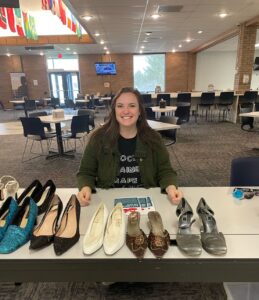 Is there a particular service or program offered by Options that you find especially impactful or meaningful? If so, why?
Is there a particular service or program offered by Options that you find especially impactful or meaningful? If so, why?
“24/7 crisis response and hotline service. When I worked as an Evening Shelter Advocate, people would call later into the night just to chat or vent. Having someone available can feel like a lifeline to people – even if it is just to get their story off of their chest. Additionally, if someone needs to come in for a sexual assault nurse examination (or law enforcement interview) late into the night or very early in the morning, it is great that we are available to help! I also think our outreach programs are essential. Awareness bolsters accessibility, so it’s incredibly important for us to continue to do things to get our name and mission out there.”
Can you share a memorable success story (while maintaining confidentiality) that highlights the impact of the work you do?
“I was working with a survivor that went through an extremely traumatic sexual assault experience. When she reached out to us, she felt at a complete loss and didn’t know what steps to take moving forward. She was also contemplating dropping out of school. I was able to connect her with those next steps and sit with her through a SANE, all of her law enforcement interviews, and all of her court appearances. She stayed in school, was able to find a safe and secure job, and is now absolutely thriving. I couldn’t be more proud of her – and I think that the support we offered along the way really impacted how her situation was handled.”
What has been your favorite training or professional development program you’ve attended/received since working with Options? What did you learn?
“I had the amazing opportunity to go to the National Sexual Assault Conference in 2023. It was incredible. I was able to expand my horizons on how to discuss sexual assault with survivors as well as communities. I also learned about restorative justice and how to address sex work in regard to sexual assault and human trafficking.
Every year I am also able to attend the Heartland Campus Safety Summit hosted by Jana’s Campaign. This summit is always fabulous and teaches me so much on how to interact with students, staff, and Title IX!”
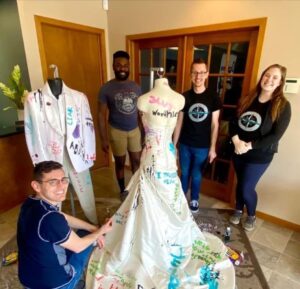 How do you practice self-care and prevent burnout, given the emotional intensity of the work?
How do you practice self-care and prevent burnout, given the emotional intensity of the work?
“I do my best to leave work at work. That is definitely easier said than done, though! I am always stressing the importance of boundaries with clients and coworkers. I absolutely believe in using personal and sick time when we need to – we have to give ourselves grace to recharge. After a particularly tough day, I like to unwind by lighting a candle, popping on my music, and reading a book (or I mindlessly scroll TikTok – either works).”
How does your position work with other community resources or organizations to support survivors?
“Because I am so involved in SARTs, I get to work closely with SANE nurses, law enforcement, and people involved in the judicial systems. I am also always working closely with the colleges and high schools in our service area. Jana’s Campaign has also been a massive community partner as we work together on the Sexual Violence Prevention and Education grant provided to us through KDHE.”
How do you build trust and rapport with survivors?
“I am honest with them. I have a direct communication style that I think many of our survivors appreciate – especially the ones in college and high school. I try not to “fluff,” my responses to them. I don’t beat around the bush when it comes to safety and how to access help. I think that this helps them to see that I want them to be independent and take control of their healing.”
In your opinion, what are the most pressing issues facing survivors of domestic and sexual violence today?
“Not being believed. Somehow, we still exist in a culture that wants to immediately place blame on a victim rather than the perpetrator. I hear things like, “Was it rape or regret?” or “What did they do to provoke that?” often. There is a huge discussion about “false reports,” but the truth of the matter is that false reports of rape and domestic violence occur less often than false reports of other crimes. AND the term “false reports” also includes situations where the victim decided to drop the case, or a judge didn’t find enough evidence – not that it didn’t happen. Rape and domestic violence are incredibly underreported, and I desperately wish people understood how difficult the reporting process can actually be.”
Could you share any misconceptions about abuse that you encounter within your role?
“Consent is an enthusiastic “yes!”
If you ask someone 33 times to have sex with you and they say “no” each time, but you wear them down to a point that they say “yes” to you on the 34th time – they aren’t consenting, you’ve coerced them into sex. Additionally, you may consent to sex, but not certain sex acts. If someone does something to you that makes you feel unsafe or harmed (or if you just want to stop in general), you can withdraw consent at any time. If someone does not heed your request to stop, that situation becomes a sexual assault.”
How do you measure success? What does a successful day or client case look like to you?
“I love seeing the survivors I work with out in the community or on campus. It can be extremely hard to operate day-to-day after you’ve experienced something traumatic like sexual assault or domestic violence. So, seeing the people I’ve worked with going on with their daily lives, staying in school, maintaining a job, makes me feel incredibly proud. I also feel that sense of pride when after a presentation or event someone comes up to me and reaches out for services. That lets me know that our outreach is effective!”
What is your favorite way that Options raises awareness and educates the community about domestic and/or sexual violence?
“I might be a little biased, but I love Rock Against Rape. Live music is something that we can all bond over. That, coupled with the messaging that alcohol doesn’t cause rape – rapists cause rape, is really important for our communities. I’m also a fan of all of the (free!!!) training opportunities we have for businesses or individuals throughout the year.”
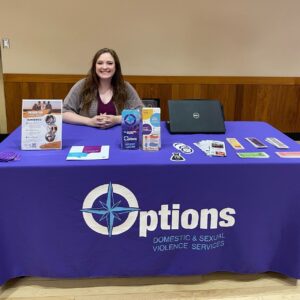 What advice would you give to someone who wants to pursue a career in advocacy work for domestic and sexual violence?
What advice would you give to someone who wants to pursue a career in advocacy work for domestic and sexual violence?
“Be prepared to make and maintain boundaries. This is a must in order to keep yourself from feeling compassion fatigue or burn out. If you feel overloaded, reach out for help. Take your time off. Take care of yourself when you feel sick.
People who are experiencing trauma may see everything as an urgent matter when it really is not. Be kind and empathetic but remember that it’s important not to treat everything like an emergency. The world won’t collapse if you can’t drop everything to bring a client their mail for the day.”
What do you wish people understood about your role? Or about working as an advocate in general?
“Advocates deal with high-stress, high-stakes situations all the time. We may not experience physical exhaustion like people who are doing physically laborious jobs, but the mental toll can certainly have an impact.”
What keeps you motivated and passionate about your work, even when it becomes difficult?
“The thought that even just one individual could be saved by contacting us or hearing one of our presentations keeps me going. Sometimes people don’t even realize that they are in abusive relationships or that they’ve been sexual assaulted until they hear us come in and talk about those situations. If I can positively impact the life of even one individual who has experienced this kind of trauma – it feels worth it.”
If you need any additional information, have a question, or a concern, feel free to reach out to Options at our 24-hour toll-free helpline 800-794-4624. You can also reach an advocate via text by texting HOPE to 847411 or click 24-Hour Chat with Options.
This grant project is supported by the State General Fund for Domestic Violence and Sexual Assault, sub-grant number 24-SGF-07, as administered by the Kansas Governor’s Grants Program. The opinions, findings, conclusions or recommendations expressed in this publication are those of the author(s) and do not necessarily reflect the views of the Office of Kansas Governor.


